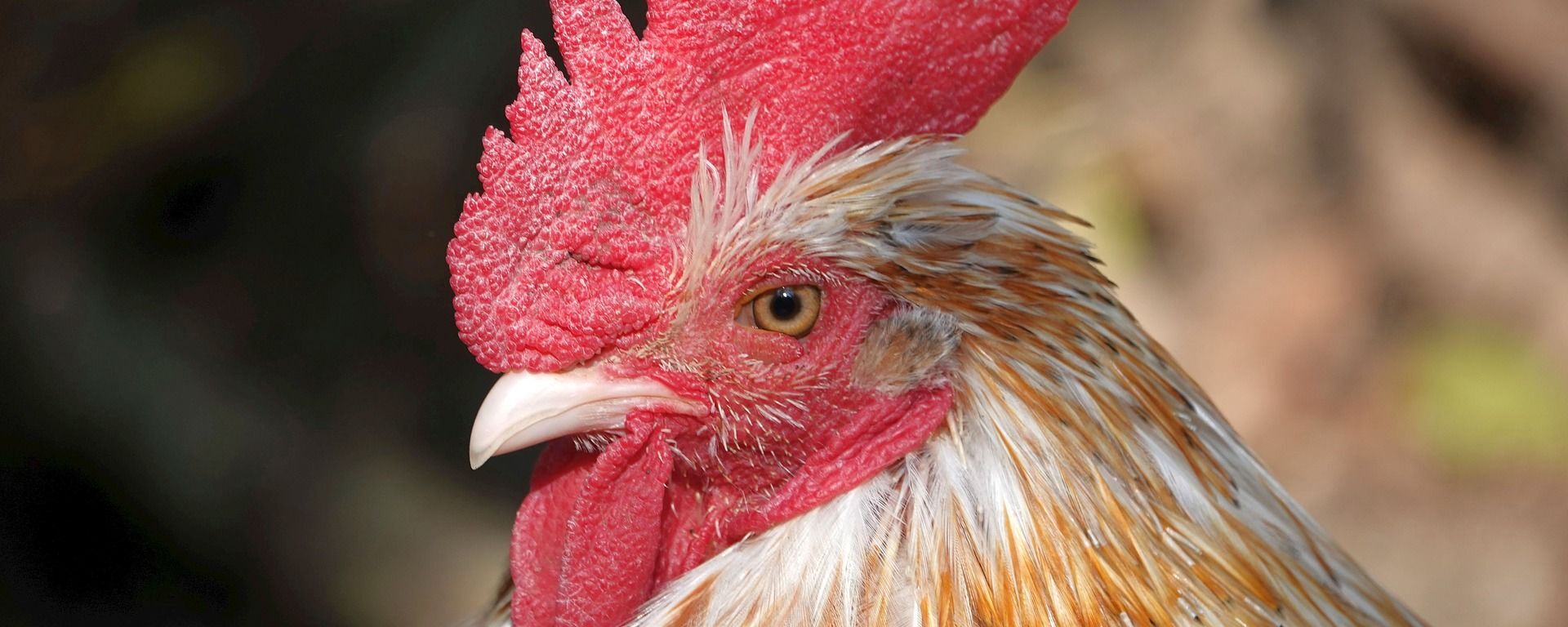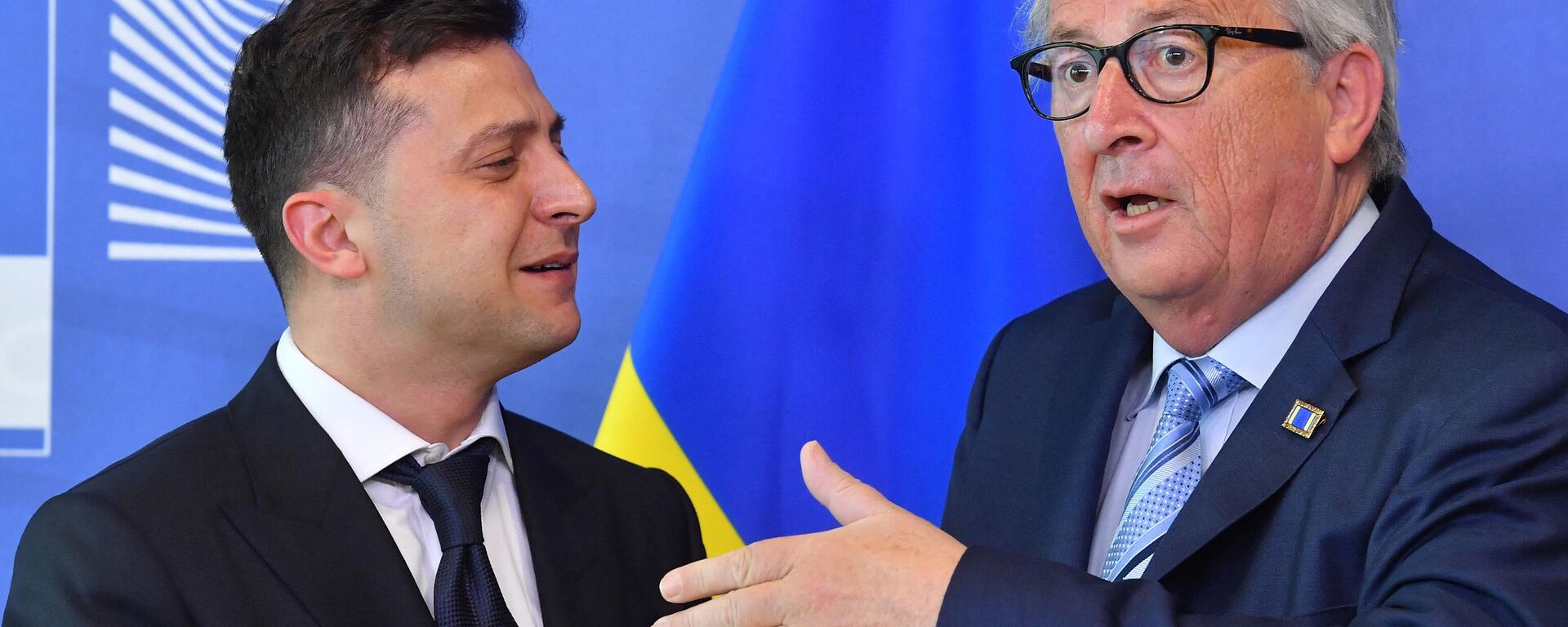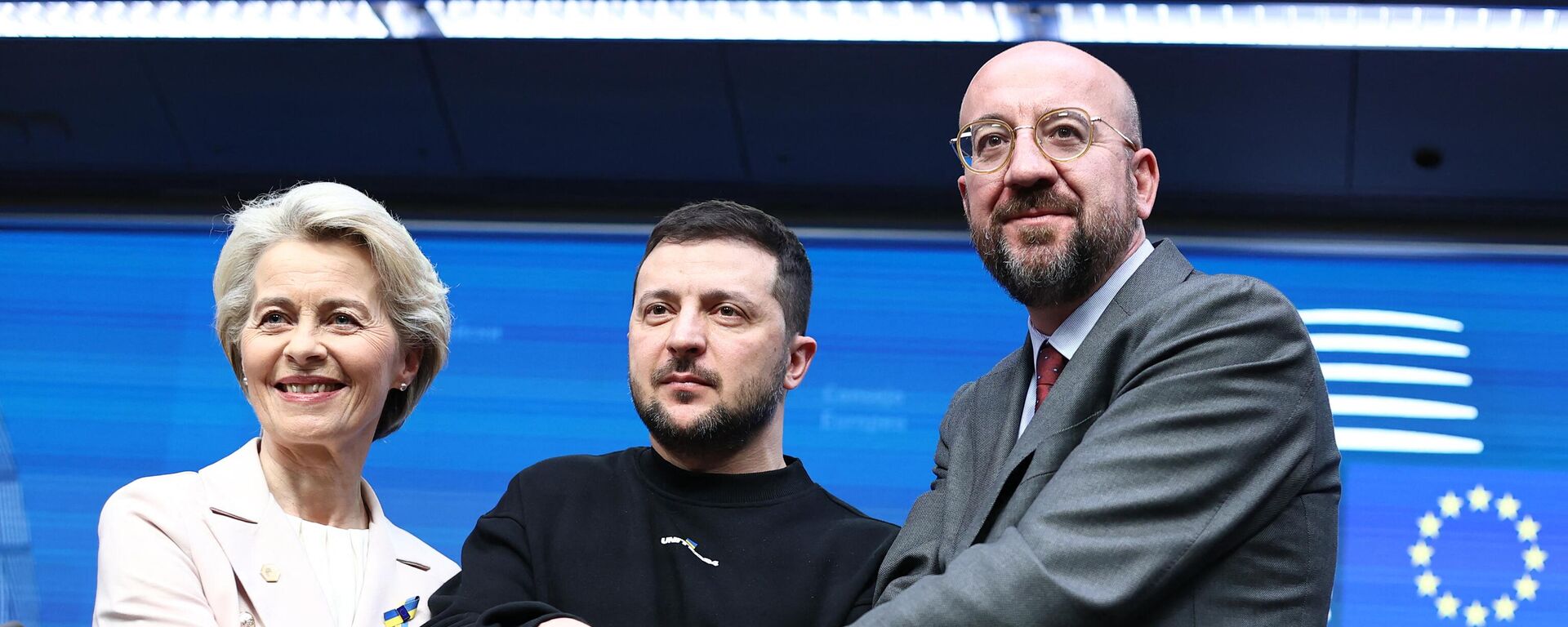https://sputnikglobe.com/20231106/ukraine-in-eu-would-take-cash-from-pockets-of-blocs-eastern-members-1114757599.html
Ukraine in EU Would Take Cash From Pockets of Bloc’s Eastern Members
Ukraine in EU Would Take Cash From Pockets of Bloc’s Eastern Members
Sputnik International
The European Commission’s executive arm is planning to publish a report on Wednesday assessing Kiev’s progress in its quest for European Union membership, with the document expected to apprise EU leaders on whether or not to approve formal membership talks. But the country could bankrupt the bloc if it ever actually gets in, observers fear.
2023-11-06T11:22+0000
2023-11-06T11:22+0000
2024-02-25T13:44+0000
world
kiev
russia
ukraine
jean-claude juncker
volodymyr zelensky
european union (eu)
european commission
eurasian economic union
maidan
https://cdn1.img.sputnikglobe.com/img/07e7/0b/06/1114757352_0:161:3070:1888_1920x0_80_0_0_30145d8ad8a0c59e5c64c99b9f017996.jpg
The lip service being paid by senior EU officials and bloc leaders about Ukraine’s progress toward bloc membership conceals an inconvenient truth: that many of the countries most forcefully cheerleading Kiev’s entry into the supranational union would stand to lose the most if it actually did so.The elephant in the room, according to a recent analysis by a Britain-based news outlet, is Ukraine’s painful level of poverty, with a GDP per capita of $4,534 and dropping an order of magnitude below the bloc’s wealthier members, like Germany. That’s not to mention the disastrous demographic collapse faced by the country thanks to the West’s push to turn it into a bridgehead for a proxy war against Russia.The media’s publication of internal projections by Brussels last month showed that Ukraine would be eligible to receive up to €186 billion in assistance over seven years if it joined the EU.That would be great news for the Zelensky government, which has been scrambling recently to find new sources of cash amid reports that up to 70 percent of the country’s budget currently depends on Western handouts and loans.But it wouldn’t be good news for the EU, and its eastern members especially, given that the cash pile of bloc subsidies is always limited, and the fact that EU countries’ calamitous decision to restrict the purchase of Russian energy has sparked a bloc-wide economic downturn threatening to make it even smaller.Observers have calculated that support for Ukraine would require slashing the EU’s farm subsidies by nearly 20 percent. Countries across the bloc, and Ukraine’s neighbors in particular, are already sore at Kiev over Ukrainian agro oligarchs’ tendency to dump cheap grain, meat and poultry onto the European market, with anger becoming so intense in recent months that it prompted the outgoing Polish government, once one of Kiev’s most fervent backers, to attack Ukraine as a “drowning man” that threatens to drag all of Europe down with it.Aside from the hefty price tag are concerns about corruption, and fears that much of the €186 billion in development assistance could simply wind up in the pockets of Ukraine’s government officials and oligarchs instead of helping ordinary people.Last month, former European Commission president Jean-Claude Juncker offered probably the sharpest critique of Ukraine’s corruption problem to date, saying the country is paralyzed by corruption “at all levels of society,” is “not eligible to join” the EU, “and needs massive internal reforms.”What Juncker doesn’t understand, or perhaps feigns ignorance of, is that these “false promises” to Ukrainians have been at the core of the bloc’s policy toward Kiev for more than two decades. The false promise of “European integration” lay at the core of the first color revolution in Ukraine in 2004-2005, and the Euromaidan coup d’état of February 2014, which saw pro-EU protesters overthrow Ukraine’s democratically elected government in a bid to cancel Kiev’s integration into the Eurasian Economic Union with Russia and sign an Association Agreement with the EU instead. The coup ultimately prompted Crimea’s residents to break off from Ukraine’s jurisdiction and rejoin Russia, sparked a bloody civil war in the Donbass, and, in February 2022, escalated into a full-blown confrontation with Moscow.Whether or not the EU’s current crop of leaders will prove fanatical enough to proceed with attempts to integrate Ukraine into the bloc just to spite Russia remains to be seen. However, if the West’s readiness to provoke a proxy war with Russia over Kiev’s possible membership in NATO is anything to go by, the answer seems to be: they will try.
https://sputnikglobe.com/20230919/cheap-ukrainian-poultry-imports-ruffle-french-farmers-feathers-1113490194.html
https://sputnikglobe.com/20231005/ukraine-corrupt-at-all-levels-not-eligible-to-join-eu---ex-bloc-head-1113960646.html
https://sputnikglobe.com/20231004/ukraines-membership-would-entail-financial-conundrum-for-eu-erode-its-cohesion-1113917891.html
kiev
russia
ukraine
Sputnik International
feedback@sputniknews.com
+74956456601
MIA „Rossiya Segodnya“
2023
News
en_EN
Sputnik International
feedback@sputniknews.com
+74956456601
MIA „Rossiya Segodnya“
Sputnik International
feedback@sputniknews.com
+74956456601
MIA „Rossiya Segodnya“
ukraine, european union, eu, russia, eurasian economic union, membership, zelensky, subsidies, assistance, aid, costs, price
ukraine, european union, eu, russia, eurasian economic union, membership, zelensky, subsidies, assistance, aid, costs, price
Ukraine in EU Would Take Cash From Pockets of Bloc’s Eastern Members
11:22 GMT 06.11.2023 (Updated: 13:44 GMT 25.02.2024) The European Commission’s executive arm is planning to publish a report on Wednesday assessing Kiev’s progress in its quest for European Union membership, with the document expected to apprise EU leaders on whether or not to approve formal membership talks. But the country could bankrupt the bloc if it ever actually gets in, observers fear.
The lip service
being paid by senior EU officials and bloc leaders about
Ukraine’s progress toward bloc membership conceals an inconvenient truth: that many of the countries most forcefully cheerleading Kiev’s entry into the supranational union would stand to lose the most if it actually did so.
The elephant in the room, according to a recent
analysis by a Britain-based news outlet, is Ukraine’s painful level of poverty, with a GDP per capita of $4,534 and dropping an order of magnitude below the bloc’s wealthier members, like Germany. That’s not to mention the disastrous demographic collapse faced by the country thanks to the West’s push to turn it into a bridgehead for a proxy war against Russia.
The media’s publication of internal projections by Brussels last month showed that Ukraine would be eligible to receive up to
€186 billion in assistance over seven years if it joined the EU.
That would be great news for the Zelensky government, which has been scrambling recently to
find new sources of cash amid reports that up to
70 percent of the country’s budget currently depends on Western handouts and loans.
But it wouldn’t be good news for the EU, and its eastern members especially, given that the cash pile of bloc subsidies is always limited, and the fact that EU countries’ calamitous decision to restrict the purchase of Russian energy has sparked a bloc-wide economic downturn threatening to make it even smaller.

19 September 2023, 11:55 GMT
Observers have calculated that support for Ukraine would require slashing the EU’s farm subsidies by nearly 20 percent. Countries across the bloc, and Ukraine’s neighbors in particular, are already sore at Kiev over Ukrainian agro oligarchs’ tendency to dump cheap grain, meat and poultry onto the European market, with anger becoming so intense in recent months that it prompted the outgoing Polish government, once one of Kiev’s most fervent backers, to attack Ukraine as a
“drowning man” that threatens to drag all of Europe down with it.
There’s more bad news for the EU’s eastern members, with the money currently being doled out to countries including Cyprus, the Czech Republic, Estonia, Lithuania, Malta, and Slovenia for infrastructure development expected to be rerouted to help Ukraine if it joined the bloc.
Aside from the hefty price tag are concerns about corruption, and fears that much of the €186 billion in development assistance could simply wind up in the pockets of Ukraine’s government officials and oligarchs instead of helping ordinary people.
Last month, former European Commission president Jean-Claude Juncker offered probably the sharpest critique of Ukraine’s corruption problem to date, saying the country is paralyzed by corruption “at all levels of society,” is “not eligible to join” the EU, “and needs massive internal reforms.”
“One mustn’t make false promises to the people of Ukraine who are up to their necks in suffering. I am very angry about the presence of some voices in Europe who are telling the Ukrainians that they can become members immediately,” Juncker said in a candid interview with German media.

5 October 2023, 17:08 GMT
What Juncker doesn’t understand, or perhaps feigns ignorance of, is that these “false promises” to Ukrainians have been at the core of the bloc’s policy toward Kiev for more than two decades. The false promise of “European integration” lay at the core of the first color revolution in Ukraine in 2004-2005, and the Euromaidan coup d’état of February 2014, which saw pro-EU protesters overthrow Ukraine’s democratically elected government in a bid to cancel Kiev’s integration into the Eurasian Economic Union with Russia and sign an Association Agreement with the EU instead. The coup ultimately prompted Crimea’s residents to break off from Ukraine’s jurisdiction and rejoin Russia, sparked a bloody civil war in the Donbass, and, in February 2022, escalated into a full-blown confrontation with Moscow.
Whether or not the EU’s current crop of leaders will prove fanatical enough to proceed with attempts to integrate Ukraine into the bloc just to spite Russia remains to be seen. However, if the West’s readiness to provoke a proxy war with Russia over Kiev’s possible membership in NATO is anything to go by, the answer seems to be: they will try.

4 October 2023, 13:57 GMT





